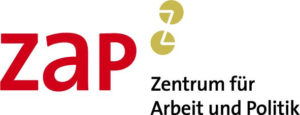The Centre for Labour and Political Education (Zentrum für Arbeit und  Politik, zap) of the University of Bremen, Germany fosters lifelong leaning with the aim to support individuals in shaping their work and learning trajectories. It was founded in 1971 as a cooperation institute between the University and the Bremen Chamber of Labour. Legally, the zap forms part of the University of Bremen.
Politik, zap) of the University of Bremen, Germany fosters lifelong leaning with the aim to support individuals in shaping their work and learning trajectories. It was founded in 1971 as a cooperation institute between the University and the Bremen Chamber of Labour. Legally, the zap forms part of the University of Bremen.
As an interdisciplinary institution, zap organises and delivers further training and adult education programmes for the Federal State of Bremen and provides guidance to labour market institutions and employee representative structures. Facilitating the effective knowledge transfer between actors and institutions of adult education is one of the Centre’s key responsibilities. Furthermore, it offers courses for individuals, who do not have a University entry qualification to facilitate their transition into Higher Education (HE) programmes. The zap thus has key expertise in the recognition of prior learning to facilitate transition between different educational tracks and into the labour market. Linking adult education, HE, the provision of guidance to individuals, companies and training institutions to applied research in a combined way constitutes a unique feature of the Centre. All training programmes and transfer projects are furthermore closely related to the world of work, which is facilitated through the close cooperation with the Chamber of Labour and trade unions. In order to enhance the permeability between non-academic and academic learning and to foster social inclusion, all training offers particularly address disadvantaged individuals (such as the low skilled and unemployed) as well as workers and apprentices. Other course programmes are targeted to volunteers active in a broad range of political and social contexts, including work councils and other forms of employee representation.
The Centre’s applied research and policy analysis focus is on democracy building, civic participation and social inclusion. In the projects as well as in the course work, which includes a significant number of socio-economically disadvantaged individuals, zap reverts to biographical and empowering approaches for learning and labour market inclusion. Another aim is to foster the dialogue and transfer between formal and nonformal learning and to support the knowledge exchange between different stakeholders, including companies, trade unions, vocational and general schools, adult education centres and a broad range of non-profit organisations.
Based on its expertise and institutional capacity, zap has been designated by the project partners to act as project coordinator.
